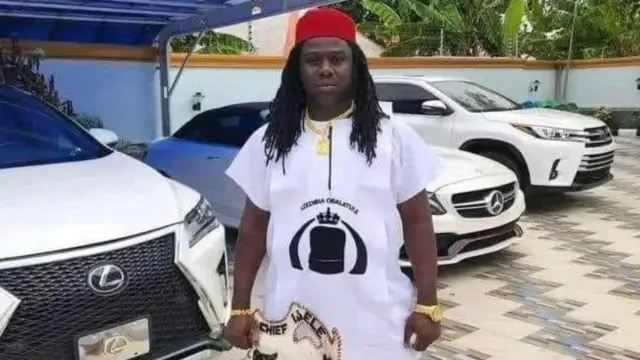The arrest of a well-known Anambra-based native doctor, Chidozie Nwangwu, popularly known as Akwa Okuko Tiwara Aki, has ignited a fierce legal battle, with accusations of political manipulation and religious suppression. Nwangwu was apprehended on Saturday, February 8, 2025, by operatives of Anambra State’s security outfit, Agunechemba, in what has now become a high-profile case raising concerns over freedom of expression and the abuse of state power.
Nwangwu’s lawyer, Ifeanyi Ejiofor, a renowned human rights advocate and counsel to Nnamdi Kanu, leader of the Indigenous People of Biafra (IPOB), has come out strongly against the arrest. In a statement released on Sunday, Ejiofor described the detention as an egregious violation of Nwangwu’s constitutional rights, calling for his immediate and unconditional release.
“This is not just a case of unlawful detention; it’s a dangerous precedent that threatens the very foundation of our constitutional rights, especially freedom of worship and expression,” Ejiofor stated, addressing the media from his office in Abuja. “The actions of the Anambra State Government raise serious questions about the use of state power for personal or political vendettas.”
According to Ejiofor, Nwangwu’s arrest followed a meeting with the Deputy Governor of Anambra State, which he had been invited to attend. However, what seemed to be a routine engagement turned out to be a trap. “The Deputy Governor personally called him to discuss a matter, but instead of a peaceful meeting, it resulted in his unlawful detention,” Ejiofor said. “The public is in the dark about what exactly transpired, but what is clear is that this arrest is politically motivated.”
The case took a more dramatic turn when a video, purportedly showing Nwangwu speaking about preparing a substance called ‘Okeite,’ started circulating online. Although it was neither posted nor promoted by Nwangwu on his social media platforms, the video has become a focal point of the controversy. Some critics have alleged that the native doctor was involved in controversial practices, but Ejiofor insists that no crime has been committed.
“Even if, hypothetically, Nwangwu made such a statement, the real question remains: What law has he violated?” Ejiofor challenged. “The Nigerian Constitution, in sections 38, 39, and 40, guarantees every citizen the right to freedom of thought, conscience, religion, and expression. These rights are fundamental and cannot be arbitrarily infringed upon.”
The video in question, although undated, was widely shared by concerned citizens and activists. Many believe that the arrest of Nwangwu is a targeted attack, aimed at silencing voices of dissent and curbing the freedom of religious practitioners. “This is a gross violation of his rights,” Ejiofor continued, stressing that the arrest was an overreach by the state in its bid to stifle free speech.
The public response has been swift, with numerous supporters of Nwangwu and rights groups rallying behind him. “The arrest of Akwa Okuko Tiwara Aki sends a chilling message to every Nigerian about the government’s willingness to trample on individual rights for political gain,” a statement from a coalition of human rights organizations read. “This is not just an attack on one man, but on the right of every Nigerian to express themselves freely, whether in their religious practices or public discourse.”
While Nwangwu is widely known for his flamboyant lifestyle and social media presence, where he often posts videos and photos of his traditional practices, this incident has cast a shadow over his reputation. Supporters argue that his arrest is a reflection of the government’s intolerance towards alternative religious practices, and a warning to others who may follow in his footsteps.
In an earlier interview with a local television station, Nwangwu had expressed his belief in the power of traditional healing and religious practices, emphasizing that his work was rooted in the culture and beliefs of the Igbo people. “What I do is not harmful, but instead, it helps many people who have nowhere else to turn,” he had stated. “I am a servant of the people, and my practices are protected by the Constitution.”
His arrest, however, has sparked a broader conversation about the limits of government power and the role of traditional practitioners in modern Nigeria. Critics argue that the state is overreaching by criminalizing religious and cultural practices that have been part of Nigerian society for centuries.
Ejiofor has vowed to pursue all legal avenues to secure Nwangwu’s release, warning that the case could set a dangerous precedent for other traditional leaders in the country. “We are prepared to take this matter to the highest courts, if necessary, to ensure that this man’s rights are upheld and that justice is done,” Ejiofor declared.

